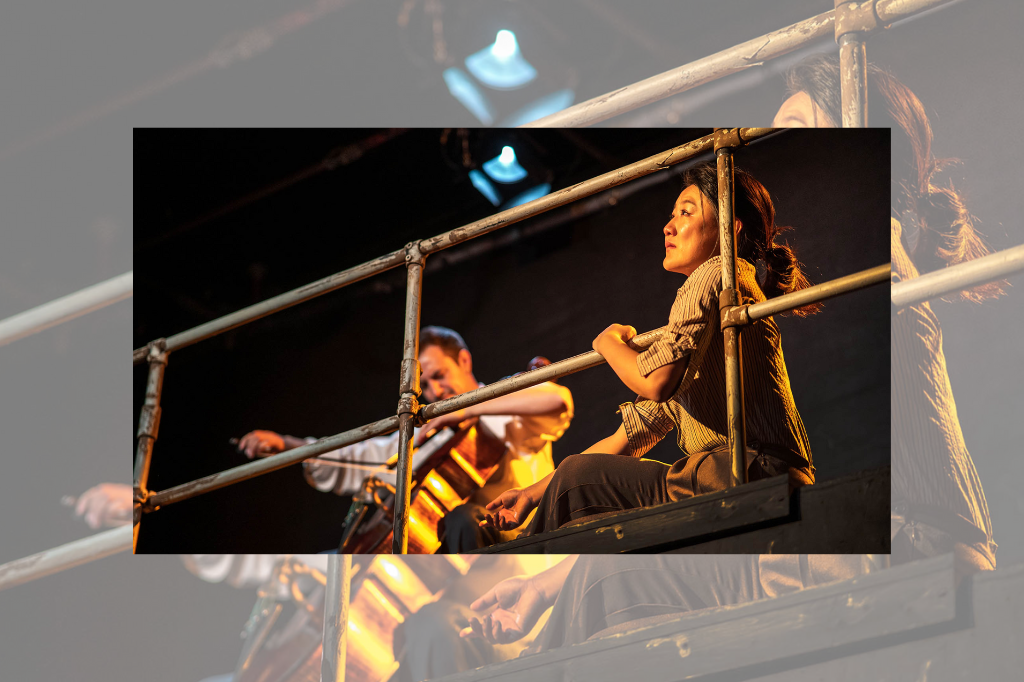REVIEW: The Year of the Cello at Theatre Passe Muraille
There’s something unspeakably sad about the cello — its mournful timbre; its proximity to the human voice; its physical clumsiness, not quite portable but not quite not.
But the cello is sadder for some than it is others.
Playwright and director Marjorie Chan’s haunting The Year of the Cello confronts a body of memory to the yearning sound of the play’s wordless co-conspirator — the cello. In a breezy sixty minutes, to the soundtrack of inventive musical compositions and arrangements by Njo Kong Kie, Chan’s protagonist, Wen (a soulful Rong Fu) recalls the Hong Kong of the 1930s, a city caught between tradition and futurism. She tells us of her childhood, the complexities and routines of growing up in this liminal locale, and about her dear friend Li-Ann, who we do not meet and who we soon learn is gone.
Wen’s an observant narrator, fascinated by the whimsy of an old-fashioned gramophone but tormented by the eternal presence of an ethereal unnamed cellist as she recounts a 1929 wave of the bubonic plague. The cellist is to blame for Li-Ann’s departure, or so says Wen, Fu maneuvering the Backspace with delicate agility as the cellist (a wordless and enthralling Brendan Rogers at the performance I attended) peers down from an imposing balcony.
A note about that Backspace: it’s had a facelift and name change since Theatre Passe Muraille closed its doors for the pandemic. It’s now called the Bob Nasmith Innovation Backspace in honour of the late, beoved actor, and is now a modular, physically accessible space which can be configured in any number of ways. In this thoughtful co-production between TPM and Music Picnic, Chan’s opted to play the long edge, so the audience stretches across the room in two rows — and for the most part, that configuration works here, fostering Detroit-at-Coal-Mine-style intimacy when action unfurls on the ground and a more removed distance via the balcony when needed. Echo Zhou’s production design is sparse, really allowing the new Backpsace to speak for itself. Quite a bit of The Year of the Cello unfolds in the balcony, and surprisingly little takes place on a bed placed smack-dab centre stage mere inches from the audience. But by The Year of the Cello’s melancholy conclusion, Chan finds spatial balance — Fu’s grace makes transitions between upstairs and down feel seamless.
The Year of the Cello places music front and centre — really, this is a three-hander between Wen, the cellist, and the cello itself — and the confluence of Bach and newly-composed experimentations in cello music is sublime. Njo’s compositions are surprising, erratic and visceral, in stark contrast to the sweeping perpetual motion of Bach. Rogers expertly executes the Bach, breathing new life into it as the cryptic villain in Wen’s story, and he explores his instrument with whimsy and wisdom in a final musical sequence. He dabbles in unconventional bowing techniques, playing the cello col legno, or with the wood of his bow; and sul ponticello, or in that oh-so-squeaky squeaky space between the cello’s bridge and its fine tuners. Pizzocato (or plucked) sections are mysterious and percussive — they sound like rainfall.
Chan’s play is a pleading love letter to a Hong Kong lost to history, a short and self-contained monologue punctuated by lengthy interludes of fantastic cello-playing. The cello and the monologue, delivered with robust precision by Fu, are nearly symphonic. While The Year of Cello will surely make a rich audio play in a few months, getting to watch Rogers practice his craft in such close quarters is a real treat — a masterclass in cello-ing.
The Year of the Cello runs October 15–29, 2022 at Theatre Passe Muraille.















Comments